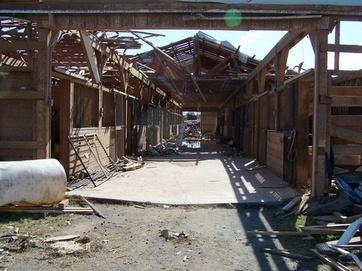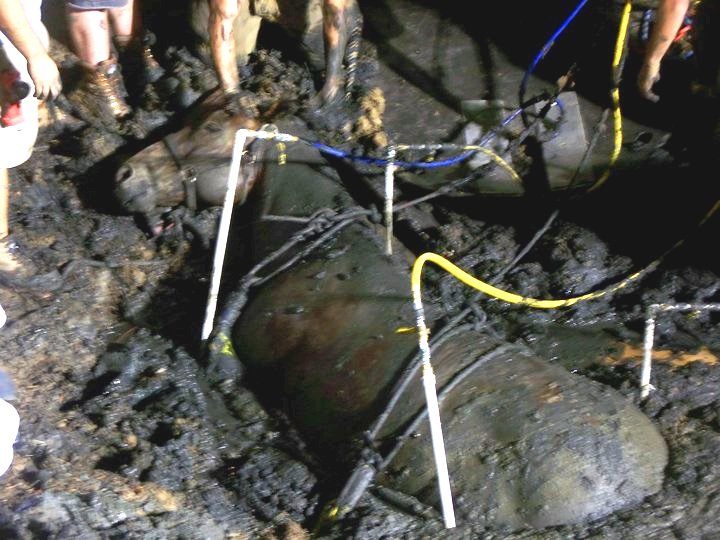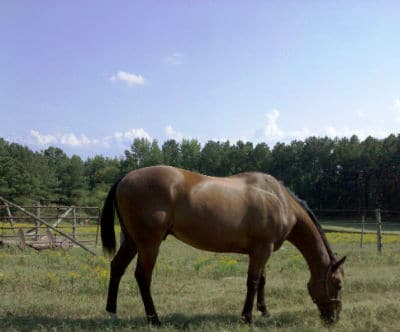Overturned Horse Trailer Learn How to Prepare for Emergency Situations Part 2 of 2
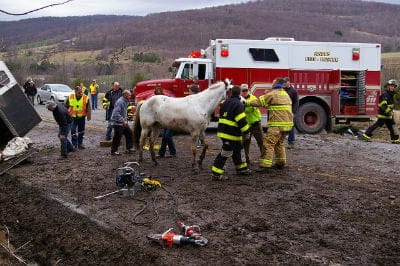
 In Part 1 of this article, you were introduced to Justin and Tori McLeod of Spring Lake, North Carolina. They are owners and sole operators of 4Hooves Farm Equine Services and North Carolina Specialized Mobile Animal Rescue Team (4HFES and NCSMART, LLC). This is one of only two mobile large animal technical rescue teams in the North Carolina. Tori and Justin are trained in large animal technical rescue techniques, which help them deal with terrifying situations like overturned horse trailers, trapped horses, or emergency evacuation efforts.
In Part 1 of this article, you were introduced to Justin and Tori McLeod of Spring Lake, North Carolina. They are owners and sole operators of 4Hooves Farm Equine Services and North Carolina Specialized Mobile Animal Rescue Team (4HFES and NCSMART, LLC). This is one of only two mobile large animal technical rescue teams in the North Carolina. Tori and Justin are trained in large animal technical rescue techniques, which help them deal with terrifying situations like overturned horse trailers, trapped horses, or emergency evacuation efforts.
If you missed Part 1 of this article, read it here.
8 Tips for Emergency Preparedness for Horse Trailers
Tori and Justin emphasize that emergency preparedness of your horse trailer, farm/facility, horses, and your self can prevent most emergency situations. Preparation can also make a rescue operation much easier.
Here are their top 8 tips for preparedness:
1. Stay Calm and Cooperative – Panicking never helps the situation and can actually prevent emergency responders from doing their jobs effectively.
2. Stay in Tune With Your Situational Awareness – While traveling with your trailer or on a trail ride, be aware of your location at all times so that you could accurately describe your location (mile markers, trail markers, intersections, city limits, etc.) if you needed to call for help.
Tori provided this example, “If you are traveling on a rural country road at night hauling your four-horse trailer and a tire blows on the truck sending the truck and trailer off the road, down a small ravine, and into a wood line, overturning in the process…you walk up the ravine only to see nothing but darkness and trees around you…” Could you tell the 911 operators where you were?
“Those important bits of information are what could save yours and your horses’ life by expediting the response of the emergency responders.”
3. Get Training and Cross-Train - Horse owners should seek out training in CPR, equine and human first-aid, large animal technical emergency rescue, trailer safety, and basic rope rigging.
“It is better to have the training and never need it then to 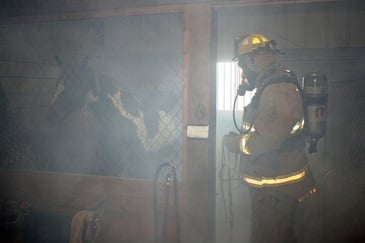
The image to the right shows a barn fire training session with local emergency responders. This particular course was led by Parelli Horsemanship professional Kelly Sigler.
4. Your Horse is Not “Your Horse” in an Emergency – It doesn’t matter how calm and bomb-proof your horse normally is, in an emergency situation, that may not necessarily be the case. “You should, in your mind, handle the horse like you have just met him and think of him more like an unpredictable, dangerous, 1500 pound fire breathing dragon that could kill you with one bite, kick, or stomp…always use the utmost caution and common sense.
5. Minimize Your Time in the Horse Trailer – Since a horse trailer is such a confined space, it is best to spend as little time as possible in the trailer while your horses are on board. “A lot can happen in a split second…several people have been found hours after death or injury inside the trailer with either no horse in sight or the horse wandering the area around the trailer,” she stated. If possible, train your horse to load on his own with you remaining outside the trailer. Always be mindful and alert and keep your time inside the trailer to a minimum. In the case of a motor vehicle accident, DO NOT enter the trailer with the horse no matter what. Wait for the emergency responders.
6. Call for Help Immediately – “Call 9-1-1, Call a Vet, Call Us.” That is Tori’s advice for anyone who is in an emergency situation. Delaying the initial call can pose a risk to your horse or to those first-responders who are attempting the rescue without specialized knowledge of how to deal with large animals. Untrained responders may even make the situation worse.
7. Get Veterinary Care – After the emergency situation, your horse may seem calm and uninjured. It is still important to seek medical care because horses are prone to stress-induced colic, hyper/hypothermia, organ displacement, or dehydration just to name a few of the medical concerns. Tori stressed, “Medical care during the rescue is just as important as medical care after the rescue.”
8. Start Training Early and Work to Desensitize Your Horse – Start training your immediately so they understand the concepts of giving to pressure, personal space, leading, and loading. You don’t want your horse to make a bad situation worse because they are too scared of the unfamiliar sights and sounds around them in an emergency.
These tips will all help horse owners prepare for the absolute worst. For Tori and Justin, they have seen some scary and desperate situations, but one sticks out in their minds.
Mud Rescue for a Horse Named Sport
Several years ago, they had just sat down for dinner when the phone rang. “We gave each other that look…we just had that feeling. Sure enough it was the county’s dispatch center.” They arrived at the scene on a hot and humid August day to find a horse named Sport had somehow become trapped in the bottom of a dried up hog lagoon for a lengthy but undetermined amount of time. The firefighters and local lay persons had already spent several hours trying to dig the horse out of the mud before they realized they were not making any progress. Upon their arrival, several factors were working against them during the rescue.
“We ended up going from Plan A all the way to Plan F or G…Justin and I could not have worked with a better group of firefighters, veterinarians and lay persons than we did that day. Even though the fire personnel had not received any specialized training, they listened to what we had to say and followed direction without hesitation.” Following their policy, the veterinarians were on hand to provide consultation, sedation, treatment, or even euthanasia before or during the rescue effort. Sport was eventually moved out of the mud and up the 15 foot embankment to the awaiting veterinarian who was ready to discuss treatment with the owner who was on location. Within days, he was back to happily grazing in the pasture. “This rescue backs up the advice we offer emergency responders, veterinarians, and horse owners/professionals…expect the unexpected, always have a back up plan (or more than one), work with and not against others, remain calm, and never give up.”
To learn more about the emergency and non-emergency services and educational sessions offered by 4HFES and NCSMART, LLC, please visit their website at www.4HoovesSMART.com. You can also contact them directly at (919) 201-6789 (Justin), (910) 494-8210 (Tori), or email NC4HoovesFarm@gmail.com.
We hope that these last two articles have provided some valuable information about preparing for equine emergencies. Now that you have this knowledge, be sure to research local providers in your home state, so that you have the information on hand. You might also consider taking a local large animal technical rescue course so that you are personally ready to handle dangerous situations. Thinking of having own 2 Horse Gooseneck trailer or larger size, contact Double D Trailers.
**Do you have any tips that you can share with fellow readers about how to either set up a service or coordinate with your local emergency responders?
**Can anyone recommend services similar to those provided by Tori and Justin McLeod in different states?
**Please share your responses below (your personal information is kept private)

